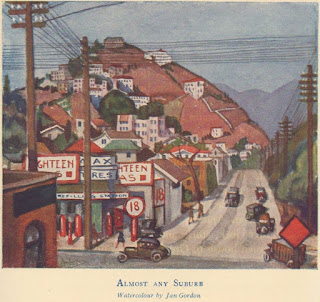Jan and Cora Gordon "By the Fireside", 1933
"From a Yorkshirewoman's Notebook," Monday October 2nd 1933 (Yorkshire Evening Post).
"I did not want to read a book from cover to cover - just to delve casually into the pages of some 'nice absurdity.' The fog was outside, and the fire within, so I settled down to laugh with Jan and Cora Gordon over some of their adventures in London after living 20 years on the continent. 'The London Roundabout,' just published (Harrap, 10s. 6d.), is a book that one can dip into time and time again and enjoy anew the odd facts and fancies taht strike these versatile artist-authors. Who but such a couple of vagabonds could tell so wittily, and yet so kindly, of their charwoman's horror on finding that 'Our Nence,' her eldest, had been posing as a model in the nude for a young artist?
Mrs, 'Arris, mother of twelve, who had ' 'ad as good as eighteen,' predicted dire results from such indecency. When Jan and Cora assured her that it was quite usual for artists to paint girls thus, and that the young man would have treated Nancy with respect, Mrs. 'Arris replied with conviction, You don't know our Nence, an' 'er with not a stitch on.'
Mrs. 'Arris is a character. She is normally an honest woman (though she expects her share of a box of chocolates - what she calls her 'perkissits'), but cannot resist taking what she fancies from open shop windows when she is 'kerrying.' The shopmen, knowing her little weakness, leave her alone, knowing from experience, that she will go round and settle up after the 'kid' is born.
But Mr. 'Arris loses all patience. If she wants them, he contends, why doesn't she buy them? And why on earth, having 'got away' with it, must she develop a conscience months afterwards?
Cora, affectionately called Jo by Jan, her husband, spends a night in a London women's doss house, as a destitute female. Here, before a roaring fire, chat the dregs of the London streets, grateful for warmth, hot water and a clean bed. There is a little brunette of 17 whose to-morrow's dinner depends on the trade she may pick up at the street corner. The little golden-haired child, plying the same profession, is pathetically proud of a letter from a messenger boy. In it, one divines, he makes some stinging remarks on her mode of earning a living, but is still in love with her; and she, blushing with happiness, cherishes the letter as carefully as any innocent country girl."
"I did not want to read a book from cover to cover - just to delve casually into the pages of some 'nice absurdity.' The fog was outside, and the fire within, so I settled down to laugh with Jan and Cora Gordon over some of their adventures in London after living 20 years on the continent. 'The London Roundabout,' just published (Harrap, 10s. 6d.), is a book that one can dip into time and time again and enjoy anew the odd facts and fancies taht strike these versatile artist-authors. Who but such a couple of vagabonds could tell so wittily, and yet so kindly, of their charwoman's horror on finding that 'Our Nence,' her eldest, had been posing as a model in the nude for a young artist?
Mrs, 'Arris, mother of twelve, who had ' 'ad as good as eighteen,' predicted dire results from such indecency. When Jan and Cora assured her that it was quite usual for artists to paint girls thus, and that the young man would have treated Nancy with respect, Mrs. 'Arris replied with conviction, You don't know our Nence, an' 'er with not a stitch on.'
Mrs. 'Arris is a character. She is normally an honest woman (though she expects her share of a box of chocolates - what she calls her 'perkissits'), but cannot resist taking what she fancies from open shop windows when she is 'kerrying.' The shopmen, knowing her little weakness, leave her alone, knowing from experience, that she will go round and settle up after the 'kid' is born.
But Mr. 'Arris loses all patience. If she wants them, he contends, why doesn't she buy them? And why on earth, having 'got away' with it, must she develop a conscience months afterwards?
Cora, affectionately called Jo by Jan, her husband, spends a night in a London women's doss house, as a destitute female. Here, before a roaring fire, chat the dregs of the London streets, grateful for warmth, hot water and a clean bed. There is a little brunette of 17 whose to-morrow's dinner depends on the trade she may pick up at the street corner. The little golden-haired child, plying the same profession, is pathetically proud of a letter from a messenger boy. In it, one divines, he makes some stinging remarks on her mode of earning a living, but is still in love with her; and she, blushing with happiness, cherishes the letter as carefully as any innocent country girl."



Comments
Post a Comment